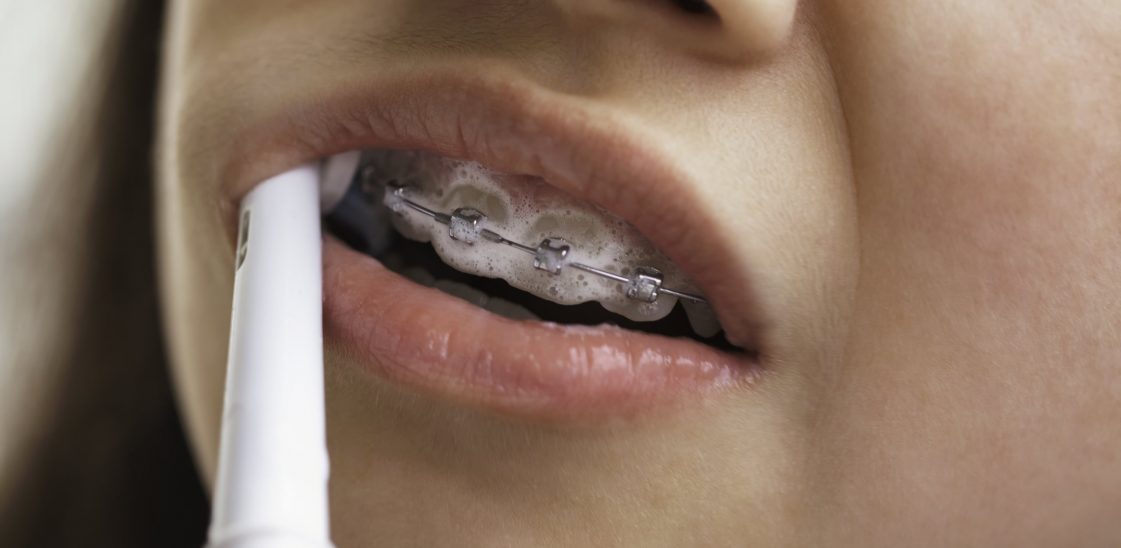
How to clean teeth with braces
Keeping good oral hygiene is important for everyone, but it’s even more important for people with braces. This is because food particles and plaque will build up not only between your teeth, but also between the braces and your teeth. Simply put, braces create more nooks and crannies for food to get stuck in.
Concerned about the difficulty of cleaning your teeth while wearing braces? Don’t worry. We’ll go through all the different ways you can take care of your teeth and braces – so you can keep on smiling.
How to take care of braces
Taking care of your braces can take many different forms – from brushing techniques to flossing routines to professional cleans. Here’s an overview of what you can do to keep your braces hygienic every day.
How to brush teeth with braces
Brushing your teeth when you have braces is much the same as brushing without braces. However, you should take extra care to avoid damaging any part of your orthodontic appliance. You can also use mouthwash as normal. We recommend that you don’t use it after brushing, as any rinsing will wash away the residue from your toothpaste, reducing its effectiveness.
You should also use the right toothpaste – one with between 1350 and 1500 ppm of fluoride. Fluoride helps to protect your teeth by reducing the amount of acid produced by the bacteria in your mouth. It can also help to strengthen your enamel. If possible, use a mouthwash with fluoride as well to increase your protection.
Remember to brush your teeth at least twice a day, for two minutes at a time. If you want to do more, then you can brush your teeth after each meal – but always try to leave at least an hour between your last meal and brushing your teeth. If you don’t, you could risk damaging your enamel.[1]
If part or all of your braces are removable, you should take them out before cleaning your teeth and clean them separately with a fluoride toothpaste. You may find it easiest to do this over a sink or bowl filled with water, as this will help prevent damage to your braces if you accidentally drop them.[2]
Can you use an electric toothbrush with braces?
Using an electric toothbrush on your braces is not only allowed, it’s encouraged. A manual toothbrush is less effective at removing plaque, while an electric one that rotates will do more to keep your teeth clean and healthy. To make it even more efficient, remember to tilt the brush to reach the backs of your teeth.[1]
What size interdental brushes are best for braces?
Interdental brushes are designed to help remove plaque from hard to reach areas, such as between your teeth, and between your teeth and your braces. They can also be used for larger gaps where a tooth is missing, to help keep the teeth on either side as clean as possible.
If you’re at all unsure about which size is right for you, it’s a good idea to try a mixed pack and start with the smallest size you think will be appropriate. A brush that is too big could cause pain or discomfort, or force gaps to widen. You may also find a range of sizes are needed to achieve a thorough cleaning, so it can be helpful to experiment to find what works best for you.[3]
How to floss with braces
As with interdental brushes and electric toothbrushes, the key to flossing while wearing braces is simply to use a little extra caution. Using floss picks will make it easier for you to remove plaque without damaging your braces – plus, they’re handy for getting that bit of food you can’t quite reach.[4]
Can you get a teeth cleaning with braces?
Yes! Your dentist or hygienist will have experience in cleaning teeth with braces, so they’ll know exactly what to do to give your teeth a professional clean. And if you don’t already get your teeth cleaned at the dentist, we recommend it – especially if you have braces. Dentists are experts in keeping teeth clean and healthy, so why not let them help you give your teeth a thorough service.
Resources:
[1] https://www.nhs.uk/live-well/healthy-teeth-and-gums/how-to-keep-your-teeth-clean/
[2] https://www.nuh.nhs.uk/orthodontics-retainers/
[3] https://www.nhs.uk/common-health-questions/dental-health/why-should-i-use-interdental-brushes/
[4] https://www.nhs.uk/common-health-questions/dental-health/why-should-i-use-dental-floss/




